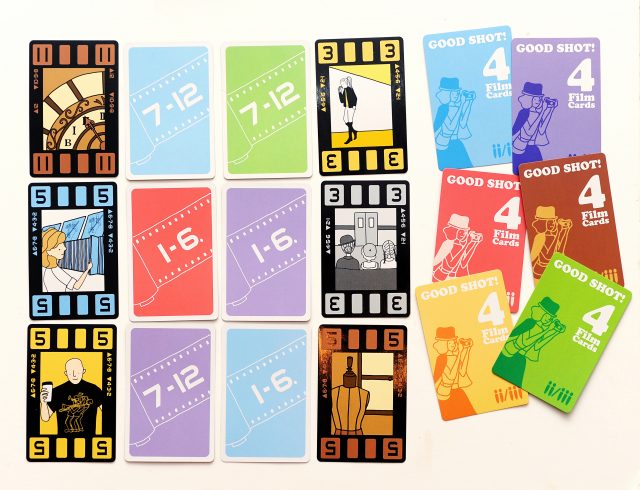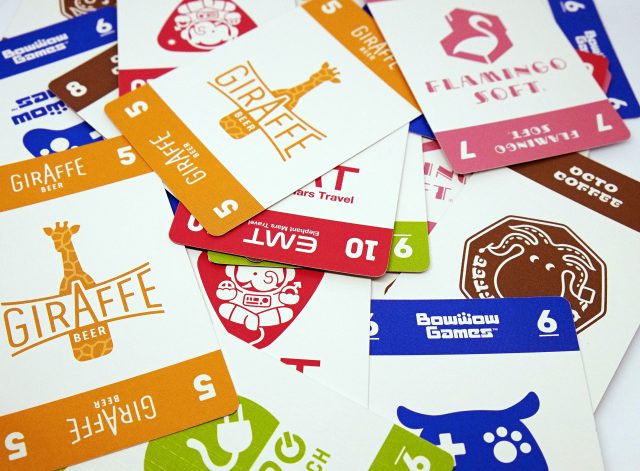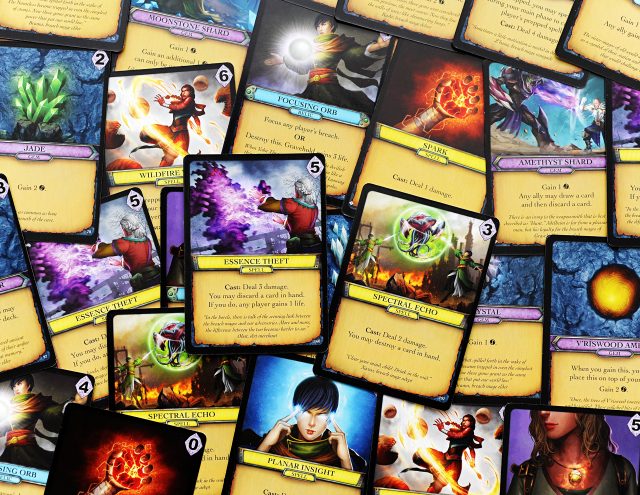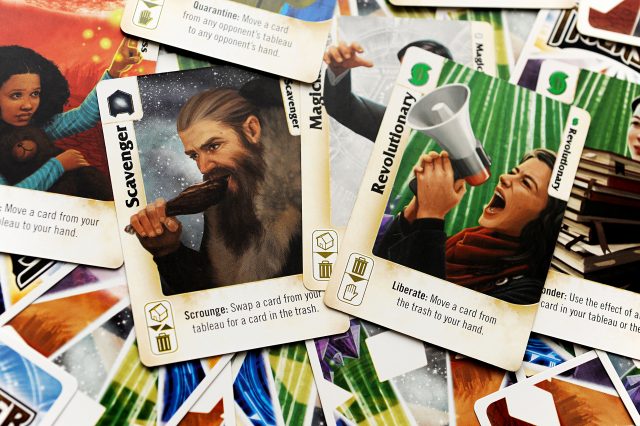by Sean J. and Nicole H.
Cards games have existed for hundreds of years and the ways that cards are used in games are constantly evolving and changing. Innovative game designers are always looking for new approaches to old ideas, and while there are some excellent conventions to card games, it’s exciting to see the how they’ve changed. Today, we’re taking a look at five different awesome card games that you should definitely check out.
 Strolling around with your half-frame camera, you’re trying to capture shots and scenes before the sun goes down. Saashi & Saashi are a smallish Japanese game design company, who tend to focus on crafting unique little games (Coffee Roaster is one of their well-known titles). Wind the Film captured my attention as a life-long photography enthusiast, and as a lover of fun little card games. The aim of the game is to take great photos before the sun sets, thus ruining your light, and at the same time hopefully getting stretches of pictures to provide you with a “good shot!” bonus. As there’s a limited amount of cards in any sequence of images (that is, a particular colour of card), you’ll be trying to grab cards hoping to get snapping your scenes before others can.
Strolling around with your half-frame camera, you’re trying to capture shots and scenes before the sun goes down. Saashi & Saashi are a smallish Japanese game design company, who tend to focus on crafting unique little games (Coffee Roaster is one of their well-known titles). Wind the Film captured my attention as a life-long photography enthusiast, and as a lover of fun little card games. The aim of the game is to take great photos before the sun sets, thus ruining your light, and at the same time hopefully getting stretches of pictures to provide you with a “good shot!” bonus. As there’s a limited amount of cards in any sequence of images (that is, a particular colour of card), you’ll be trying to grab cards hoping to get snapping your scenes before others can.
Gameplay is nice and simple, with some little twists of hand management, similar to another fabulous card game, Bohnanza. Your turn consists of picking up between 1 – 3 cards from a shared field on the table and placing them at the front of your hand, then “winding the film” – that is, moving one card forward in your hand a certain amount – and finally playing the same amount of cards you picked up, but from the back of your hand. Your photos are placed out in a numerical sequence, and if you manage to get a large enough one, it’s worth some great points game-end. Any cards you have to play that are out of sequence are “out of focus” and can really gum up the works of your lovely sequence. Wind the Film is such a delight to play, and the art and quality of the printing is out of this world. I only hope that more folks can get their hands on it if S&S manage to get a decent North American distribution deal.
 Ever since trying Deep Sea Adventure, i’ve been keen on giving anything that Oink Games puts out a try. All sorts of games fit into those little boxes, and I was delighted to discover Startups late last year as a terrific card game from Oink! It plays up to 7, and it’s so great to have a game in my collection that can play that many, and is a nice quick one. It’s been a hit at conventions and game nights alike. The basics of the game boil down to taking a card and playing a card on your turn – either to your personal tableau to try and gain the majority of a stock before game end, or to the marketplace because you’re not interested.
Ever since trying Deep Sea Adventure, i’ve been keen on giving anything that Oink Games puts out a try. All sorts of games fit into those little boxes, and I was delighted to discover Startups late last year as a terrific card game from Oink! It plays up to 7, and it’s so great to have a game in my collection that can play that many, and is a nice quick one. It’s been a hit at conventions and game nights alike. The basics of the game boil down to taking a card and playing a card on your turn – either to your personal tableau to try and gain the majority of a stock before game end, or to the marketplace because you’re not interested.
Why wouldn’t you be interested in trying to gain stocks, no matter what type? Well, you could get into something you won’t end up gaining the majority in – there are six companies to gain stock in, starting at the lower end where there’s only 5 cards of its type, up to the high end where there are 10 cards of that type. There will be a constant struggle to come out on top, and you’ve really got to keep an eye on what people are building up to – not to mention there are 5 cards secretly removed from the game so you may be banking on a card that’ll never come.
At game end, if you end up with a majority in a company, anyone else with stocks owes you for every card they have of that type. Great! But you have to remember that the same goes for everyone else, and you might end up paying out more than you bring in. This is such a terrific, cut throat card game with a swift play time – all in that little package. I think Startups sort of hits the No Thanks buttons for me, with the “you really can only do a very simple thing on your turn but oh boy, is there some strategy behind it all”. I highly recommend getting your hands on this one!
 Hanabi was a ground breaking game when it came out a few years back. The concept of seeing everyone else’s cards, but not your own, while having to work together to play out cards in order was simply put, brilliant. So much so, it was awarded the Spiel des Jahres. However, let’s be honest, there isn’t a lot of theme attached to the actions that you’re taking. Sure, there’s something about setting off fireworks, but at the end of the day, it’s incidental to the actions you’re taking.
Hanabi was a ground breaking game when it came out a few years back. The concept of seeing everyone else’s cards, but not your own, while having to work together to play out cards in order was simply put, brilliant. So much so, it was awarded the Spiel des Jahres. However, let’s be honest, there isn’t a lot of theme attached to the actions that you’re taking. Sure, there’s something about setting off fireworks, but at the end of the day, it’s incidental to the actions you’re taking.
Since its release, there have been a number of games that have tried to perfect that same mechanic like Beyond Baker Street and Abraca-What, but it’s not been until recently that I think a game has really knocked it out of the park.
In 13 Clues, you become detectives hired by Scotland Yard to help stop a crime wave sweeping across London. Each player has their own personal screen with card slots on either side. Players are able to see the cases of all the other detectives on the outside of their screen, as well as two cards on the inside that are hidden knowledge for only themselves, but they can’t see the elements of the crime (a culprit, weapon, and location) they are trying to solve. By questioning the other players and accessing face down cards in the centre of the table, you are able to start to put the pieces together.
13 Clues is essentially Hanabi meets Clue, but it is a fun, simple deduction game that I’ve had a ton of fun and success with a variety of game groups and player counts. It’s the first game that in my mind, has taken the Hanabi mechanic and made it competitive.
 There have been a lot of interesting cooperative deckbuilders in recent years. Harry Potter Hogwart’s Battle quickly jumps to mind. It might have made this list if we weren’t so enamoured with some playtesting we’ve been doing for a new Legacy-style version of Aeon’s End.
There have been a lot of interesting cooperative deckbuilders in recent years. Harry Potter Hogwart’s Battle quickly jumps to mind. It might have made this list if we weren’t so enamoured with some playtesting we’ve been doing for a new Legacy-style version of Aeon’s End.
Players take on the role of Breach Mages and team up to defend the city of Gravehold from the invading evil forces of the Nemesis. The Nameless fiends enter the world through breaches, but mages have learned to harness that power and turn it against their tormentors.
Each player gets a character board with a special ability. They have a weak starting deck, which they’ll improve by spending gems in a common market. All that sounds pretty standard, but there are a couple factors that set Aeon’s End apart. First, you NEVER shuffle your deck. When you run out of cards, you just flip them over and refill your hand. This makes for some very interesting decisions as to how you play and discard. The second really cool idea, is that you can’t just shoot spells at your opponents, you have to prep them in a breach. You start with four breaches, but only one is open. You have to spend aether (the currency in the game) to open the others. The last innovation I really liked is a small one, but made for really fun gameplay. Turns are driven by a turn order deck. Each character has a card and the Nemesis has two. Cards are flipped and when your character’s card comes up, you take your turn. The Nemesis attacks when their cards are flipped. When the cards run out, you shuffle them and flip for turns again. This means you might have the first turn in one round and the last of another or two turns in a row. It’s the anticipation of the flipping cards that makes it fun.
Aeon’s End takes a familiar idea and makes it fresh and different and that’s why it makes the list.
 Trickster is another interesting take on a card game designed by Daniel Solis featuring art by Beth Sobel. The Trickster of the title refers more to the way the game is player, rather than the ‘tricks’ you’re trying to win. In fact, you’re trying to avoid taking any cards.
Trickster is another interesting take on a card game designed by Daniel Solis featuring art by Beth Sobel. The Trickster of the title refers more to the way the game is player, rather than the ‘tricks’ you’re trying to win. In fact, you’re trying to avoid taking any cards.
The Trickster deck has 112 cards made up of 14 Heroes in eight different suits. Each game you play, you’ll choose seven of the Heroes to use, making for a 56 card deck. Cards are dealt out and a trash of face-up cards is formed. The Leader for the first round can be selected randomly, and the person to their left becomes the Trickster. The Leader (you guessed it) leads a card, a Hero in one of eight suits. Now the Trickster has a choice: they can play the same Hero in a different suit, or the same suit but different Hero, or they can play a different suit and different Hero. Whichever path they choose everyone else has to follow that pattern. If a player can’t adhere to that rule, they bust and must take all the card into their tableau. However, if everyone is able to follow the Trickster’s play, they have to take the cards to their own tableau.
Cards in your tableau count against you at the end of the round, unless you have the most cards in a suit. In that sense you sort of shoot the moon and you’re free and clear. After three rounds, the player with the best score wins the game.
Now, each of the different Heroes have a special ability that is activated when the card is played. This can allow you to get rid of cards from you tableau, or gain them if you’re trying to shoot the moon. You could also interact with the trash, or steal cards from other players. The powers of the Heroes can have some interesting synergies and mixing and maxing them makes for a lot of replayability, but I’d suggest using some of the pre-made sets at least at first because some of the combinations work better than others.
Comments
No comments yet! Be the first!